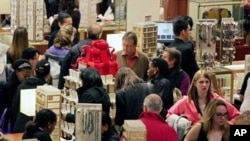For many Americans, the day after Thanksgiving, often called "Black Friday," marks the traditional beginning of the holiday season, when consumers crowd stores in search of Christmas and Hanukah gifts, and retailers hope to make a good profit. However, in today's ailing U.S. economy, that consumer spending is down.
For New Yorkers, the sound of hand bells being rung outside Macy's department store by red-bedecked Salvation Army volunteers is as sure a sign of the holiday season as the crowds of shoppers along Manhattan's 34th Street. This is Ram's second season here.
"We're always out here every Black Friday and enjoy being out here with the people and the noise and everything," Ram said. "The sight and smells and seeing the window displays and all of that. You can't beat it here in New York City. There are all kind of things going on. But it's still frantic," he said.
Indeed, one can see a certain frenzied joy in Belinda's face, as she sorts through a rack of discounted ladies sweaters in a store nearby. She is one of thousands who came to shop the Big Apple from out of town, looking for bargains.
BELINDA: "Oh it's crazy! I'm getting hot in the stores there are so many people. But it's pretty cool. My cousins and my girlfriend came down with me so we are having a lot of fun. For us it's a good hearted thing because we are just sort of taking our time."
PHILLIPS: Some people say the economy is very hard this year because people have less money. Is that a factor for you?
BELINDA: "Yes it is… Actually it even affected my job. I lost my job in September so…."
PHILLIPS: "How does that alter the equation for you?"
BELINDA: "It alters the type of things I would buy [and] how much I would buy. We draw names in the family, names so instead of [each person] buying for everybody, each person will pick one person. Then everybody still gets something."
When people have little or no work, the people who would normally be hired to sell to those people can also lose their jobs. That's what has Winnie, a saleswoman in a small clothing shop, concerned.
PHILLIPS: "How does it feel from the beginning of the Christmas season from your point of view?
WINNIE: "It's not that good. It's like so-so, you know."
PHILLIPS: "So business isn't so great right now."
WINNIE: "No I don't think so. Because people don't have the money to buy, there are lots of people who don't have jobs."
PHILLIPS: "Is your job in danger?"
WINNIE: "Yeah."
The generous aisles of the Golden Mall Jewelry Shop are crowded, but Sammy, the manager says that most are just looking, not buying. He is guardedly optimistic on the season's first shopping day, but adds that business has been slow all year.
SAMMY: "Very much. I would say more than fifty percent, it's been down. We see a sign of improvement but we have to see sales."
PHILLIPS: "Hanukah is also here. Is that part to your business too or is it really just Christmas stuff?"
SAMMY: "We celebrate everything as long as they give us money."
PHILLIPS: "Is that the true spirit of it?"
SAMMY: "That's the true spirit of it."
Whether the true spirit of the season is expressed best through cash or gift-giving and carols or some wholly American hybrid emotion, this much is clear: today's dampened economic climate offers little cause for merriment.
Restrained Joy as Americans Launch Christmas Shopping Season




